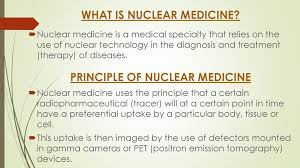Advanced Practice in Nuclear Medicine
Mar 29, 2023
This paper discusses advanced practice in nuclear medicine, a subspecialty of radiology. The paper outlines the roles and responsibilities of advanced practitioners in nuclear medicine, including diagnostic imaging for a variety of diseases and conditions, therapeutic procedures using radioactive materials, patient safety protocols and clinical research opportunities. It examines educational requirements for these professionals, including post graduate certifications or fellowships. Lastly, it provides an overview of career paths available to those with advanced degrees in nuclear medicine.
The scope of practice for advanced practitioners in nuclear medicine is vast and varied. Diagnostic studies utilizing radioisotopes are used to assess various organ systems or structures within the body as well as pathologies such as cancer and infections. Therapeutic techniques involve performing treatments or therapies that use radioactive materials to treat an illness. Nuclear medicine technologists are also knowledgeable in using specialized imaging modalities, such as PET/CT and SPECT-CT scans.
Advanced practitioners must be aware of safety precautions when handling radioactive material or performing treatments, as well as understand the principle of radiation protection. This requires knowledge of regulations and protocols set out by governing bodies such as the International Atomic Energy Agency (IAEA). Furthermore, they need to adhere to local laws and regulations concerning patient rights and privacy in order to ensure ethical treatment of patients at all times.

In addition to diagnostic and therapeutic procedures, advanced practitioners can take part in clinical research opportunities. With a background in nuclear medicine, these professionals can contribute significantly towards expanding our understanding of diseases and treatments.
In order to qualify as an advanced practitioner in nuclear medicine, postgraduate qualifications are necessary. Depending on the country, certifications or fellowships are required for practice. It is also beneficial to be familiar with current trends and developments within the field by attending relevant conferences and workshops or reading up on journals published in the area of nuclear medicine.
Advanced practitioners in nuclear medicine can look forward to various career opportunities upon completion of their certification or fellowship program. These professionals may choose to work in a clinical setting such as hospital departments, outpatient clinics, imaging centers, health care providers’ offices and laboratories. They may also pursue research positions at universities or medical institutions. Moreover, they could also move onto management roles related to nuclear medicine, such as in product sales or radiation safety.
In conclusion, advanced practice in nuclear medicine is a rewarding and challenging field of study with promising career prospects for highly qualified professionals. With knowledge of both diagnostic and therapeutic techniques, as well as an understanding of safety protocols and ethical considerations, advanced practitioners can make significant contributions to the field. Postgraduate qualifications are essential for those wishing to pursue their career in this area. Professionals who have achieved these certifications or fellowships can look forward to various opportunities within the field of nuclear medicine.
